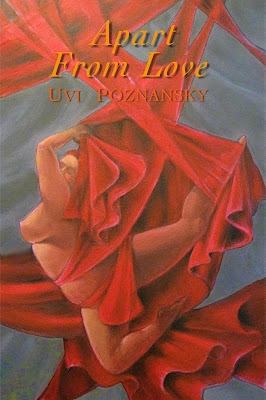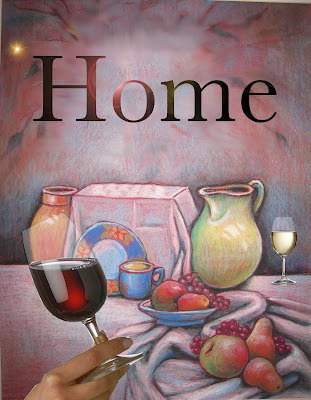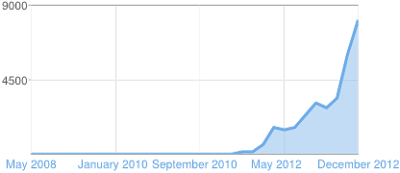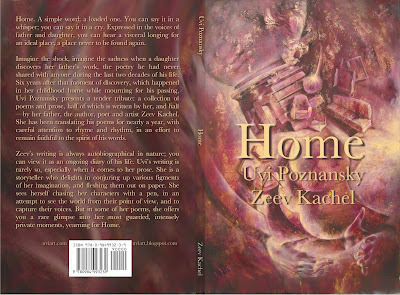 Uvi’s
Comments
(group member since Apr 09, 2012)
Uvi’s
Comments
(group member since Apr 09, 2012)
Uvi’s
comments
from the The Creative Spark with Uvi Poznansky group.
Showing 961-980 of 1,283
 This morning I woke up to discover my 'book brief' on the Indies Unlimited site. It gives you the bare essentials of my novel, Apart From Love. Check it out here: http://www.indiesunlimited.com/2013/0...
This morning I woke up to discover my 'book brief' on the Indies Unlimited site. It gives you the bare essentials of my novel, Apart From Love. Check it out here: http://www.indiesunlimited.com/2013/0...
One more piece of good news: thanks to the readers, Apart From Love is rising up the ranks in the competition Best Independent Novels on Goodreads (a social network for readers. So if you are a member of Goodreads, and if you have read the book and think well of it, please cast your vote:
http://www.goodreads.com/list/show/12...
 Memory
Memory Written by Zeev Kachel
Translated by Uvi Poznansky
When the past becomes your present
And follows you everywhere
Like a hunting dog, it's so intent
Then memory becomes despair
Memory, by a sudden spell
Then becomes your daily routine
Reality turns into hell
A crazy race to the unseen
You set your ladder on a ripple
No wonder that you fell, you cripple

The original Hebrew text of this poem appears in Ropes, Separation, Tear which was published by me in February of 2012, in tribute to his memory. I used my pencil-on-paper drawing of a twisting rope as the basis for the cover of that book. The word Ropes in Hebrew has an additional meaning, beyond the obvious one: it means pain (as in growing pains or pain during childbirth.)
The English version of this poem, along with an entire collection of my father's work, is now included in my poetry and prose book, Home.
 "I knew it the very next morning, and I still know it now: My brother hates me. He has removed me from his mind, stricken away any thought, any memory about me. I am dead to him. The scary part is, that being dead will not stand in the way of him killing me, if ever he lays eyes on me again.
"I knew it the very next morning, and I still know it now: My brother hates me. He has removed me from his mind, stricken away any thought, any memory about me. I am dead to him. The scary part is, that being dead will not stand in the way of him killing me, if ever he lays eyes on me again.It is an odd feeling. Have you ever faced it? Being dead to someone you envy; someone you miss, too; someone who knows you intimately and, even worse, has the chutzpa to occupy your thoughts day in, day out. It grinds down on your nerves; doesn’t it?
Trust me, being dead to your brother is not all that it is cracked up to be, but it does set you free—oh, don’t act so surprised! It frees you from any lingering sense of obligation. Brother, you say to yourself. What does it mean, Brother? Nothing more than a pang, a dull pang in your heart.
You have betrayed him. Accept his hate."
Yankle, in A Favorite Son

My retelling of the biblical story of Jacob and Esau takes the time to concentrate on two things: the contemplation of the crime, and the mental anguish afterwards. Here is another view of my Ceramic sculpture of the character. It is called "What if my father touches me."
 Dolores wrote: "My review...
Dolores wrote: "My review...http://www.amazon.com/review/RBU64SMW..."
Thank you so much Dolores! Your reviews are aways so eloquent and beautiful, each one exceeds the previous one! Lovely.
 To those of you who are unfamiliar with my work, here is a way to introduce myself. I feel honored that RDW Creations (which provides freelance creative writing, publishing and literary services) introduced my work on their site. In the article they show my two books Apart From Love and Home, and--get this-- a link to my art site, check it out!
To those of you who are unfamiliar with my work, here is a way to introduce myself. I feel honored that RDW Creations (which provides freelance creative writing, publishing and literary services) introduced my work on their site. In the article they show my two books Apart From Love and Home, and--get this-- a link to my art site, check it out!http://www.rdwcreations.com/Author-Sp...
 Things are happening so fast that my head is spinning! Author of War Songs, Grady Harp is an artist representative, gallery owner, writer of essays and articles on figurative and all Representational art for museum catalogues and for traveling exhibitions, and an Amazon Hall of Fame Reviewer. He describes himself as being ever on the alert for the new and promising geniuses of tomorrow. So I am deeply honored that he has posted this five-star review for my just-published ebook, A Favorite Son:
Things are happening so fast that my head is spinning! Author of War Songs, Grady Harp is an artist representative, gallery owner, writer of essays and articles on figurative and all Representational art for museum catalogues and for traveling exhibitions, and an Amazon Hall of Fame Reviewer. He describes himself as being ever on the alert for the new and promising geniuses of tomorrow. So I am deeply honored that he has posted this five-star review for my just-published ebook, A Favorite Son:5.0 out of 5 stars Betrayal and Consequences, January 1, 2013
By Grady Harp (Los Angeles, CA United States) - See all my reviews
(HALL OF FAME REVIEWER) (VINE VOICE) (TOP 50 REVIEWER) (REAL NAME)
This review is from: A Favorite Son (Kindle Edition)
Uvi Poznansky has that enviable ability to push paint and words into that category of combining reality with fantasy, myth with story, tradition with contemporary sidebars. She has ably accomplished that in THE FAVORITE SON, drawing upon the Biblical tale of Isaac and his twin sons by his late birthing wife Rebecca - Jacob and Esau.
Isaac is growing old and his inheritance is to be passed to his firstborn. Therein lies the problem: Esau and Jacob were twins and in Poznansky's version, Esau pushes Jacob to the back of the womb allowing Esau to be the firstborn son. An inimical relationship dwells between the brothers - Esau is big and hairy and a hunter while Jacob is more his mother's son, interested in cooking and in the beautiful clothes and jewelry his mother Rebecca owns. Rebecca (or Becky as she is called in this quasi updated version) favors Jacob and plans the deception of Isaac by designing a goatskin arm form a beloved coat to place on Jacob's arm when Isaac will make the pronouncement of his passing of the inheritance. Or interest, Jacob has already tricked Esau with his cooking wiles and Esau has promised Jacob his inheritance. But as the story develops the sibling rivalry is complicated by the mother's intervention and Jacob is granted the inheritance as well as the love of the father who has always favored his older brother.
What Poznansky has managed to do is include many of the aspects of the lineage of Abraham to Isaac to Jacob and the stories that surround them: in Poznansky's tale the miracle of Jacob's ladder is inserted - and even that happed long after the birthright theft. She manages to bring the story forward by inserting contemporary language (Isaac even promises Rebecca the equivalent of a Rolls Royce!) and in doing so she opens the old story to be instead a lively psychological study of family and of greed and longing for paternal love and more. It works spectacularly well. Would that more of the Old Testament stories could be updated like this then perhaps more children would be fascinated with the abundant mythological stories of the Bible. Grady Harp, January 13
You can take a look at the review here: http://www.amazon.com/dp/B00AUZ3LGU
 "When I sprinkle my secret blend of spices; here, take a sniff, can you smell it? When I chop these mouthwatering sun-dried tomatoes, add a few cloves of garlic for good measure, and let it all sizzle with lentils and meat—it becomes so scrumptious, so lip-smacking, finger-licking, melt-in-your-mouth good!
"When I sprinkle my secret blend of spices; here, take a sniff, can you smell it? When I chop these mouthwatering sun-dried tomatoes, add a few cloves of garlic for good measure, and let it all sizzle with lentils and meat—it becomes so scrumptious, so lip-smacking, finger-licking, melt-in-your-mouth good!There is a certain ratio of flavors, a balance that creates a feast for the tongue and a delight for the mind; and having mastered that balance, with a pinch of imported cumin from the north of Persia, a dash of Saffron from the south of Egypt, I can tell you one thing: When the pot comes to a full bubbling point, and the aroma of the stew rises up in the air—it would make you dribble! Drive you to madness! For a single bite, you would sell your brother, if only you had one! "
This is the voice of Yankle, in my new ebook, A Favorite Son. It came out just a couple of days ago! You can take a look at it here: http://www.amazon.com/dp/B00AUZ3LGU
Modeled on the biblical story which is truly fascinating to me, this is a present-day twist. At this point in the story he is preparing a lentile stew for his brother, Esau, who comes home so hungry from a day of hunt, he is prepared to throw away up his birthright for a bite of that stew.

Later in the story Yankle will resort to cheating his father, who is lying on his deathbed, to steal away the inheritance. Here is a ceramic sculpture of Jacob preparing to wear the hide of a kid on his arm, so that if his father will touch him, he will mistake Jacob for his hairy brother Esau. In this piece, I focus on the moment of contemplating the crime, rather than the moment of action. He is about to make a choice: is the inheritance truly worth the price of losing his honesty, his soul?
 Just finished reading Closed Doors, a Trilogy by Rich weatherly, and here is what I thought of it:
Just finished reading Closed Doors, a Trilogy by Rich weatherly, and here is what I thought of it:The first part of this trilogy is Toxic Situations, a novella written in a cinematic manner, centered on a international crime and intrigue. It starts in the vaults of the Center for Disease Control, where Craig Wells Jr. aided by his partner, Dan Turner, are on the case: two rival terrorist groups aim to take hold of lethal capsules of a deadly flu virus, which were developed in a US research laboratory. Written in a fast pace action sequence, this suspense story nonetheless provides a gripping description of the dangers of biological pathogens. The author, Rich Weatherly, has compiled a novella, Toxic Situations, a short story, Family Secrets, and an autobiographical note, Thrills at the Esplanade Cinema, into the covers of this book. It is a body of work inspired by a prolific professional career, which includes technical writing, poetry, and photography, with a personal outlook on the world we live in. While the novella lends itself to becoming a suspense film, the other two short stories provide the underpinning of the author's world view and where he is coming from. As hinted in his epilogue, Richard Weatherly lived through several close encounters with death. As a result, his outlook on life took on a new meaning, which guided his pen in the writing of this trilogy...
To read my review in full, here's the link:
http://www.goodreads.com/review/show/...
 The minutes are ticking till midnight
The minutes are ticking till midnightLet's dance them away; let's take flight
It's the end, the beginning, time once again
To raise a glass and uncork the champagne!

I invite you to join my book launch event: Favorite Figures
 The cover of my upcoming ebook is based on a mixed media paining I painted not long ago. In it I floated various paints on the paper, letting them drizzle and mix, to create an intricate, fiery flow of color. Then when they dried out I came in with a black pen, and drew just a few lines to suggest the figure.
The cover of my upcoming ebook is based on a mixed media paining I painted not long ago. In it I floated various paints on the paper, letting them drizzle and mix, to create an intricate, fiery flow of color. Then when they dried out I came in with a black pen, and drew just a few lines to suggest the figure. To me, this is what this image means: looking directly at yourself, facing the pain and the ugly imperfections within, without any attempt to mask who you are—even if you find yourself on the verge of a meltdown. Which is the process the protagonist, Yankle, is going through in this story. He finds himself coming to terms with his core being, with how the tension between his emotions and needs has driven him over a lifetime.

As in my previous book cover designs, the font of the book title and the author name casts a subtle shadow over the image. However, One detail is different here: Two of the letters of the author name cast a shadow like all the other letters, but the two glyphs themselves—the objects that cast the shadows--are intentionally missing. Why? For two reasons.
First, because often in my art I discover that the eye is drawn to the unexpected, and the brain rises to the challenge when there is a missing link to resolve. The observer, then, becomes engaged with the art, and in a sense, becomes its creator.
And second, because this missing detail is a symbol, an indication of the flawed character in this story. Stay tuned for more...
 This year is not over yet, but here are some interesting numbers I wish to share with you. Here are some 'behind the scenes' details about the number of visitors that have come to my art and writing blog over the last year. As you can see, the monthly number has skyrocketed! It has gone up from 0 to nearly 9000 visits per month.
This year is not over yet, but here are some interesting numbers I wish to share with you. Here are some 'behind the scenes' details about the number of visitors that have come to my art and writing blog over the last year. As you can see, the monthly number has skyrocketed! It has gone up from 0 to nearly 9000 visits per month. (Note: only your visits count here. I have set it up so it does not count my own visits.)
Pageviews today
485
Pageviews last month
8,314
Pageviews all time history
31,339

For more information click http://uviart.blogspot.com/2012/12/th...
 Angela wrote: "I loved this part of the book, as I have a great friend who has invited me to Passover for many years"
Angela wrote: "I loved this part of the book, as I have a great friend who has invited me to Passover for many years"Thank you so much Angela!
 Home, with a cover image based on my oil painting, is in a cover contest! Currently is in fifth position (out of 90 books) on Goodreads' Best Illustrated Book Covers. If you are a Goodreads member and you like the cover, please vote for it.
Home, with a cover image based on my oil painting, is in a cover contest! Currently is in fifth position (out of 90 books) on Goodreads' Best Illustrated Book Covers. If you are a Goodreads member and you like the cover, please vote for it. http://www.goodreads.com/list/show/33...

 In my novel Apart From Love, Ben refuses, for the longest time, to give up on his mother, who has been diagnosed with early-onset Alzheimer's. But in the later part of the novel he is finally facing the moment of truth:
In my novel Apart From Love, Ben refuses, for the longest time, to give up on his mother, who has been diagnosed with early-onset Alzheimer's. But in the later part of the novel he is finally facing the moment of truth:And this, this is the moment when the truth comes to me, clear and naked in its full ugliness, and I cannot deny it, cannot ignore the horrific meaning of what she who used to be my mother does next:
Sensing a presence next to her, she stirs back, as if by instinct, and for a split second smacks her lips. He may think this is a sign, perhaps of gratitude. I can see the sudden relief, the surprise in his smile. His eyes start closing, as if in anticipation of a kiss.
And then, then she opens her mouth, like some animal—a lizard comes to mind—hungry for its prey. She stays there, seemingly lazy, utterly motionless, jaws dropped, chin hanging, waiting for her feed. Waiting, waiting, waiting for more. Waiting without a word. Waiting with a need that can no longer find its satisfaction, the need of a body, an empty shell of a body whose mind has finally left it. Waiting, because mom will never be able to give.
At once I let go of the double doors so they swing, and come to a close. And I turn, and I run, run out of that place as fast as I can, so as not feel her eyes, looking at me without taking me in.
I am still running. I have to, because I find myself held still in that moment, when the truth has come to me, damn it. Who can be so brazen as to deny it, and who wants to take a second look.


In this charcoal sketch you can see how I study the features of the face at the moment of shock, when in a flash, you are facing that which you would not face before. A moment of truth can be a personal one, which you experience in private, or a communal one. Which is why I used this sketch also in my large oil painting, Earthquake.

